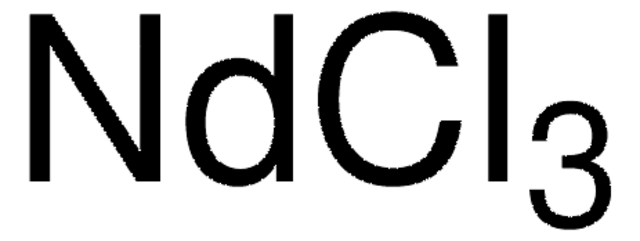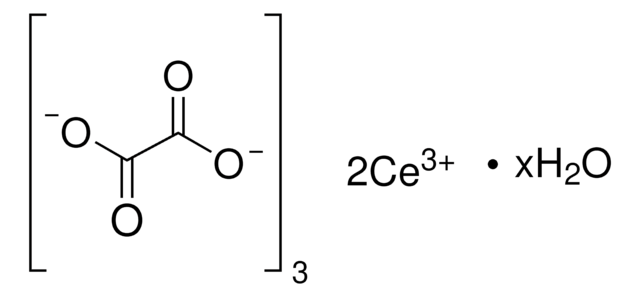429406
Cerium(III) chloride
AnhydroBeads™, −10 mesh, ≥99.99% trace metals basis
Synonyme(s) :
Cerium trichloride, Cerous chloride
About This Item
Produits recommandés
Gamme de produits
AnhydroBeads™
Niveau de qualité
Pureté
≥99.99% trace metals basis
Forme
beads
Pertinence de la réaction
reagent type: catalyst
core: cerium
Impuretés
≤100.0 ppm Trace Rare Earth Analysis
Taille des particules
−10 mesh
Pf
848 °C (lit.)
Densité
3.97 g/mL at 25 °C (lit.)
Chaîne SMILES
Cl[Ce](Cl)Cl
InChI
1S/Ce.3ClH/h;3*1H/q+3;;;/p-3
Clé InChI
VYLVYHXQOHJDJL-UHFFFAOYSA-K
Vous recherchez des produits similaires ? Visite Guide de comparaison des produits
Description générale
Application
- The role of dynamic ligand exchange in the oxidation chemistry of cerium (III): This study explores the redox chemistry of cerium, utilizing Cerium(III) chloride in oxidation reactions to understand its potential in various chemical transformations (JR Robinson et al., 2016).
- Photocatalytic C- C bond cleavage and amination of cycloalkanols by cerium (III) chloride complex: Examines the photocatalytic properties of a cerium(III) chloride complex, used for C-C bond cleavage and amination, highlighting its potential in organic synthesis (JJ Guo et al., 2016).
- Dehydration, hydrolysis and oxidation of cerium chloride heptahydrate in air atmosphere: Investigates the behavior of hydrated forms of Cerium(III) chloride under varying conditions, contributing to understanding its stability and reactivity (S Xue et al., 2017).
Autres remarques
Informations légales
À utiliser avec
Mention d'avertissement
Danger
Mentions de danger
Classification des risques
Aquatic Acute 1 - Aquatic Chronic 1 - Eye Dam. 1 - Skin Corr. 1C
Code de la classe de stockage
8B - Non-combustible corrosive hazardous materials
Classe de danger pour l'eau (WGK)
WGK 2
Équipement de protection individuelle
dust mask type N95 (US), Eyeshields, Gloves
Faites votre choix parmi les versions les plus récentes :
Déjà en possession de ce produit ?
Retrouvez la documentation relative aux produits que vous avez récemment achetés dans la Bibliothèque de documents.
Les clients ont également consulté
Articles
We carry a large variety of electrophiles and nucleophiles that are widely used in C–C bond-forming reactions. This group of products contains many organometallic reagents as well as commonly-used alkylating and acylating reagents.
Notre équipe de scientifiques dispose d'une expérience dans tous les secteurs de la recherche, notamment en sciences de la vie, science des matériaux, synthèse chimique, chromatographie, analyse et dans de nombreux autres domaines..
Contacter notre Service technique













